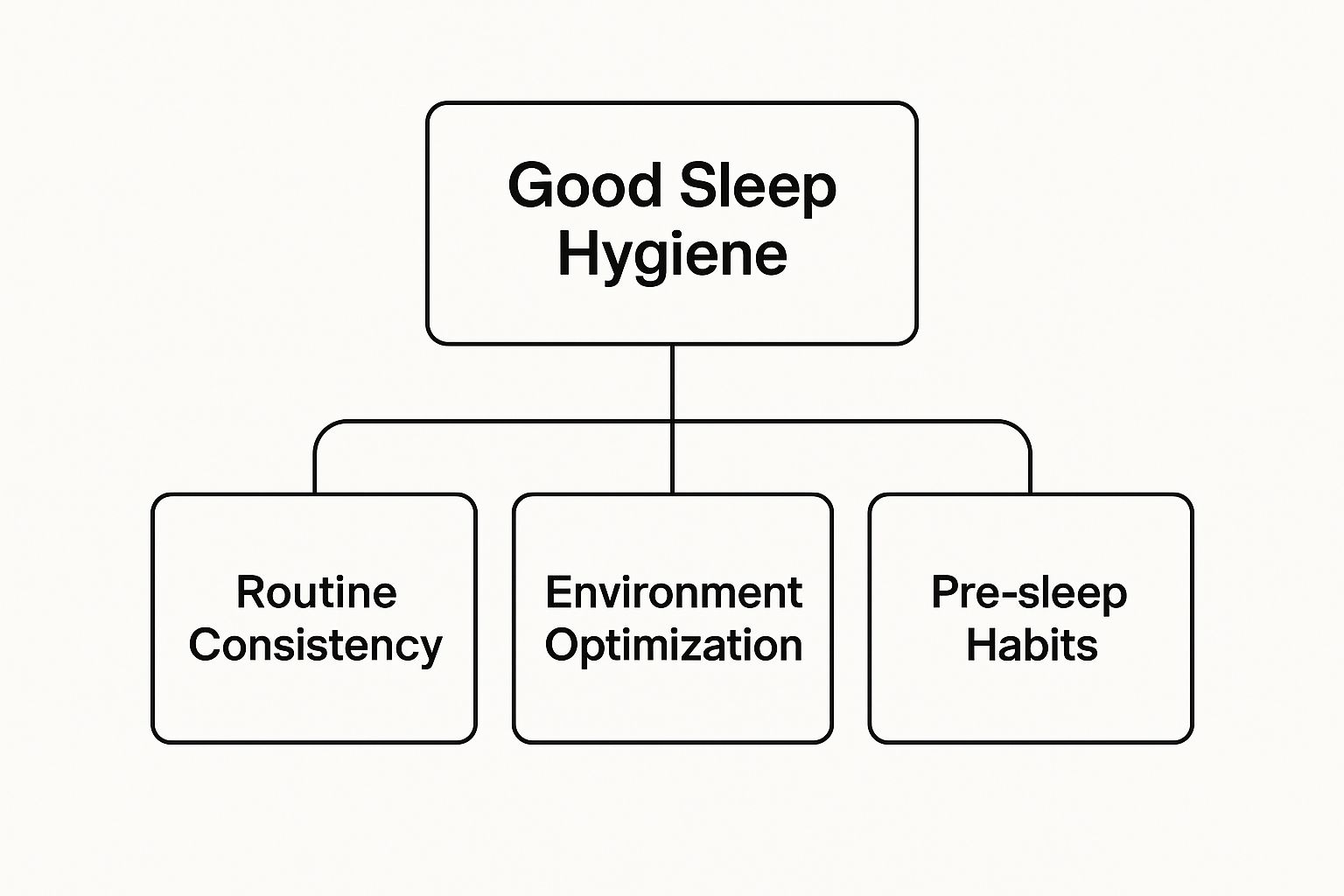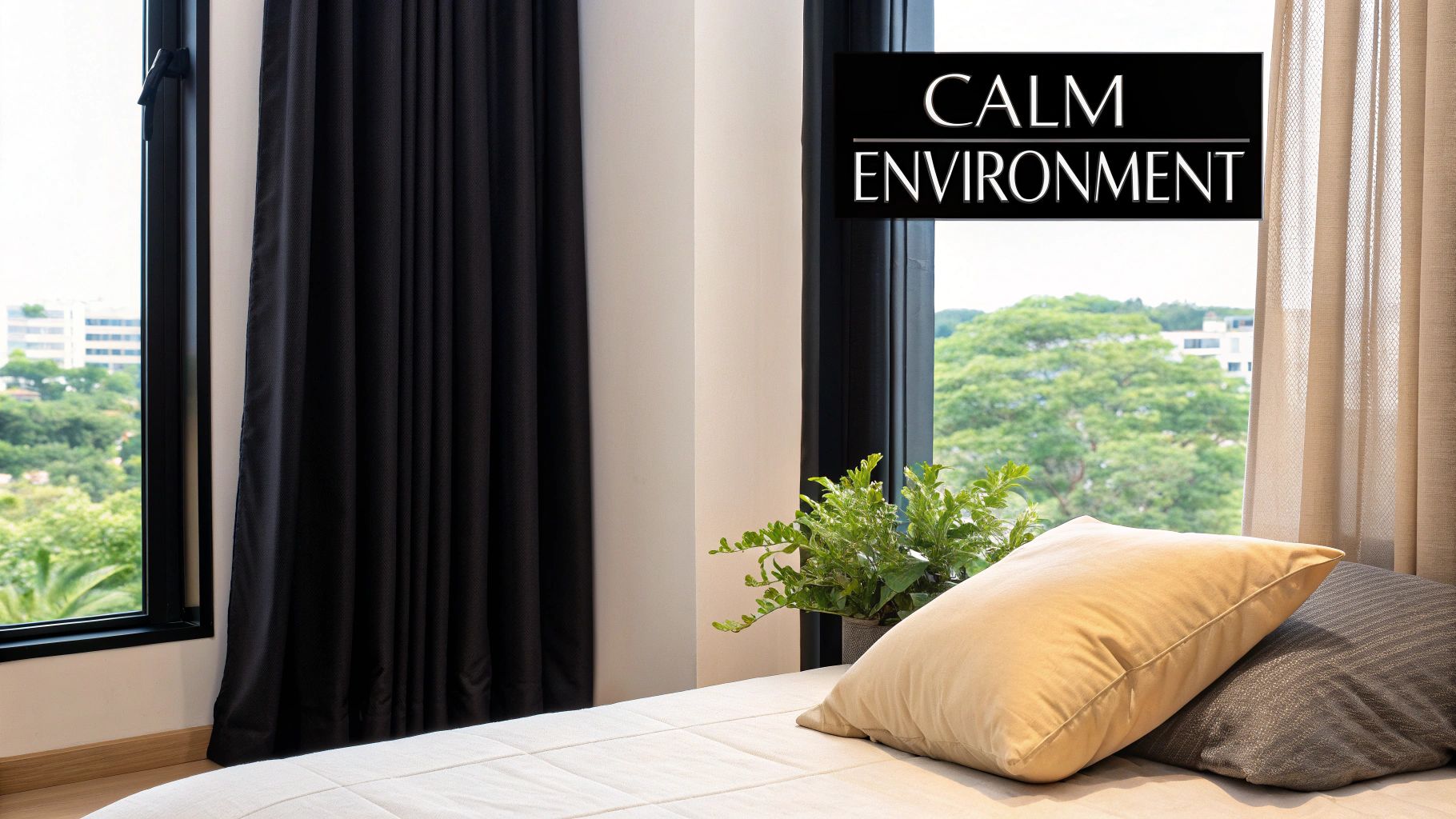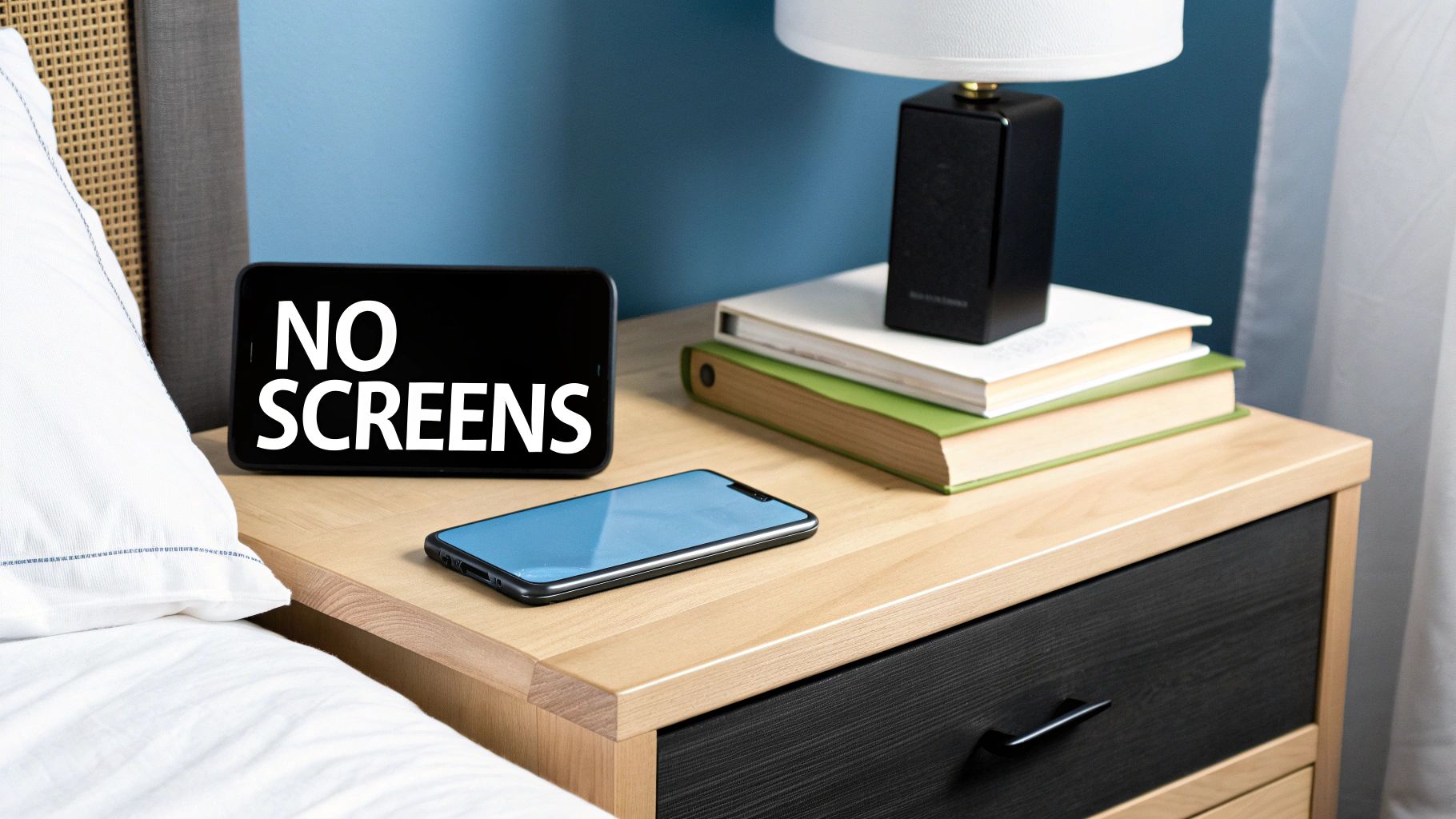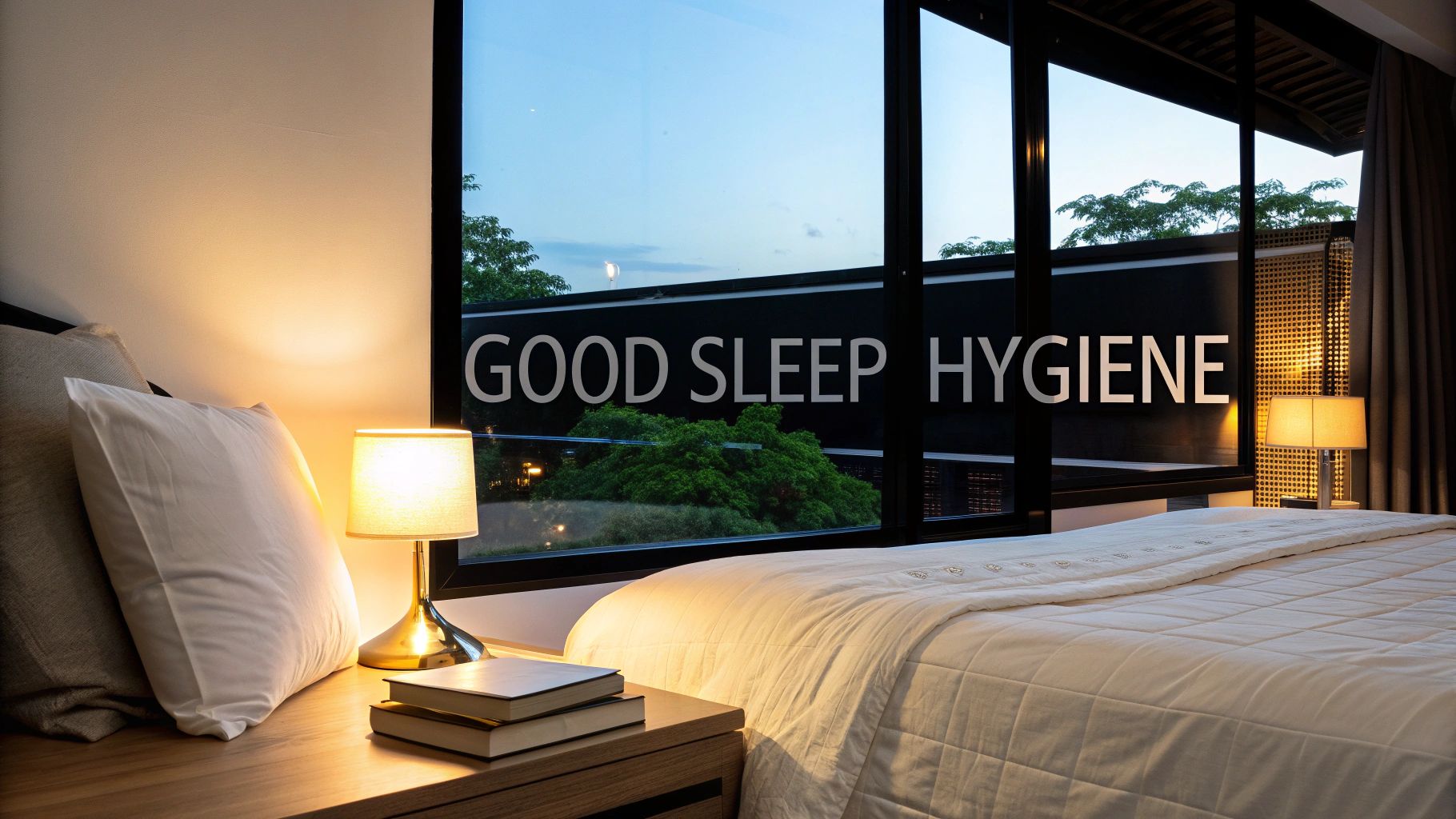When people mention "good sleep hygiene," they aren't talking about how often you wash your bedsheets, although that's lovely too. They mean building a collection of supportive, everyday habits that set you up for a fantastic night's sleep.
Think of it as creating a calm, predictable runway that lets your mind and body glide smoothly into rest. It isn’t about perfection. It’s about crafting a practical routine that helps you fall asleep faster and wake up feeling properly refreshed.
Understanding the Foundations of Good Sleep Hygiene
So, what does this idea of ‘sleep hygiene’ really mean? It’s less about clinical rules and more about creating a personal routine for better rest. Essentially, it’s all the small, consistent things you do throughout your day and evening that send a clear signal to your brain: it’s time to wind down.
This isn’t some rigid, complicated plan you have to follow exactly. It’s simply about understanding how your surroundings, your daily habits, and your evening rituals all play a part in how well you sleep. With just a few thoughtful changes, you can make a huge difference to your energy levels, mood, and overall health.
The benefits are significant. When you practise good sleep hygiene, you’re working with your body’s natural internal clock, your circadian rhythm, not fighting against it. This simple alignment helps you doze off more easily, stay asleep through the night, and get more of that deep, restorative rest your body needs.
The Key Pillars of Restful Sleep
It’s no secret that many of us are struggling with sleep. In the UK, for instance, adults are consistently missing out on the rest they need. Those aged 26 to 45 get just 6.4 hours a night on average, a far cry from the recommended 7 to 9 hours. You can dig deeper into the latest data on UK sleep habits for a fuller picture.
This problem often comes down to a few core areas. To make it clearer, let’s look at the three fundamental pillars that form the foundation of good sleep hygiene.

As you can see, it all boils down to Routine Consistency, Environment Optimisation, and Healthy Pre-Sleep Habits. Getting these three areas right gives you a powerful, straightforward roadmap to transforming your sleep quality and boosting your daytime energy.
To give you a clearer idea of what this looks like in practice, here's a quick comparison of good versus bad habits.
Good Sleep Hygiene At a Glance
| Pillar | Helpful Habit (Good Hygiene) | Unhelpful Habit (Poor Hygiene) |
|---|---|---|
| Routine Consistency | Going to bed and waking up at roughly the same time, even on weekends. | Having a chaotic sleep schedule that changes daily. |
| Environment Optimisation | Keeping your bedroom dark, cool, quiet, and used only for sleep. | Watching TV, working, or scrolling on your phone in bed. |
| Healthy Pre-Sleep Habits | A relaxing wind down ritual, like reading a book or taking a warm bath. | Consuming caffeine or alcohol close to bedtime. |
Mastering these three pillars is the key to unlocking consistently better sleep. It’s about making small, intentional choices that, over time, add up to a huge improvement in how you feel every single day.
Why a Consistent Sleep Routine Works Wonders

Think of your body as having an internal conductor, a master timekeeper that runs the show behind the scenes. This is your circadian rhythm, and just like any good conductor, it thrives on a predictable schedule. The single most effective way to keep this internal clock in perfect time is to stick to a consistent sleep routine.
It might sound overly simple, but going to bed and waking up around the same time every day, yes, even on weekends, is the foundation of great sleep hygiene. This powerful habit trains your brain to anticipate rest, making it much easier to naturally wind down when it’s time for bed. This simple act of regularity can dramatically improve the quality of your sleep.
When your body knows what to expect, it starts to align all its internal processes, from releasing sleep inducing hormones to regulating your core temperature. This is why a chaotic sleep schedule often leaves you feeling groggy and out of sync, even if you technically got enough hours of sleep.
How Consistency Transforms Your Sleep
Building a steady sleep schedule is like laying a solid foundation for your entire day. The benefits are far reaching, improving everything from your mood to your concentration. A predictable routine doesn't just help you fall asleep faster, it encourages your body to enter deeper, more restorative sleep cycles throughout the night.
So, what does this look like in real life? By sticking to a regular schedule, you're essentially programming your internal clock for optimal performance. This leads to some very real benefits you'll feel day in and day out.
- You'll Fall Asleep More Easily: As your set bedtime approaches, your body will automatically start its wind down process, meaning less tossing and turning.
- You'll Experience Deeper Sleep: A stable routine promotes more time in the crucial deep and REM stages of sleep, which are vital for physical recovery and mental consolidation.
- You'll Wake Up Genuinely Refreshed: Waking at the same time helps to regulate your sleep wake cycle, making it easier to get out of bed with energy instead of reaching for the snooze button.
This predictable pattern reinforces your body’s natural desire for sleep, creating a powerful positive feedback loop. The better your routine, the better you sleep, and the better you feel.
Practical Steps to Build Your Routine
Creating this kind of consistency doesn’t mean you need to completely overhaul your life. In fact, small, gradual changes often make the biggest impact. Start by picking a wake up time you can realistically commit to every day. From there, work backwards to set a bedtime that allows for the recommended 7 to 9 hours of sleep.
If your current schedule is all over the place, don't panic. Just try shifting your bedtime and wake up time by 15 minutes every few days until you hit your target. This gentle approach gives your body a chance to adapt without it feeling like a shock to the system.
Remember, the goal here is consistency, not rigid perfection. If you have a late night here and there, it’s not the end of the world. Just get back on track the next day. Your body will thank you for it.
How to Create Your Perfect Sleep Sanctuary

Your bedroom should be a peaceful retreat dedicated to rest, not just another room in the house. Think of it as a sanctuary, a space that signals to your mind and body that it’s time to switch off and recharge. This is a cornerstone of good sleep hygiene.
You don't need a complete overhaul to achieve this. It's really about mastering a few simple but incredibly powerful elements that create the perfect conditions for deep, restorative sleep. By focusing on making your room dark, quiet, and cool, you can dramatically improve your chances of falling asleep easily and staying asleep all night.
Keep It Dark
Light is the most powerful signal our brain uses to decide whether it's time to be awake or asleep. Even a tiny bit of light from a streetlamp, a phone charger, or a digital clock can interfere with your body's production of melatonin, the essential hormone that makes you feel sleepy. Your mission is to make your room as close to pitch black as possible.
- Blackout Blinds or Curtains: These are your first line of defence against outside light, creating a cave like atmosphere that encourages uninterrupted rest.
- Cover or Remove Electronics: Those little glowing lights on TVs and chargers are more disruptive than you think. A small piece of tape can cover them, or better yet, move them out of the bedroom entirely.
- Try a Sleep Mask: If you can't get your room completely dark, a comfortable sleep mask is a fantastic, simple trick to create your own personal pocket of darkness.
Keep It Quiet
Sudden noises are notorious for pulling you out of deep sleep, even if you don't fully wake up and remember them. A quiet, predictable soundscape helps your brain relax and feel secure, letting you drift off without being jolted awake by traffic, a noisy neighbour, or even a snoring partner.
Even while you're asleep, part of your brain stays on alert for sounds. Consistent, gentle background noise can effectively mask those sudden interruptions, creating a more stable and peaceful environment for rest.
If you live in a noisy area, a white noise machine can be an absolute game changer. Its steady, soothing hum drowns out disruptive sounds, creating a calm and consistent audio backdrop. A simple fan can often do the same job, providing a gentle whir that helps lull you to sleep.
Keep It Cool and Comfortable
Did you know your body temperature naturally drops as it prepares for sleep? A cool room supports this process. The ideal sleep temperature for most people is somewhere between 16 and 19 degrees Celsius. This slightly cooler air makes it easier for your body to fall asleep and stay that way.
Of course, temperature isn’t just about the thermostat; your bedding is a huge part of the comfort equation. A supportive mattress and the right pillows are the foundation, but what you wrap yourself in is what truly completes the sanctuary. Breathable sheets and a cosy comforter stop you from overheating while still keeping you snug. For anyone who dreams of that plush, hotel bed feeling, a fluffy white comforter can turn your bed into an irresistible haven you’ll genuinely look forward to sinking into every night.
Ultimately, your bedroom should be a space reserved almost exclusively for sleep. When you fine tune these three elements, darkness, quiet, and comfort, you build a powerful mental link between your bed and restorative rest.
The Link Between Your Day and Your Night

The quality of your sleep tonight really started taking shape this morning. It’s a concept many of us overlook, but the choices we make from the moment we wake up have a direct, often profound, effect on how well we rest. Good sleep hygiene isn't just a pre bedtime checklist; it’s a commitment that spans the entire day.
Most people don't realise just how much our daily rhythm dictates our sleep quality. Simple, everyday things, like when you enjoy your morning coffee or whether you step outside for a bit of sun, are constantly sending signals to your internal body clock. By making just a few mindful adjustments throughout the day, you can set the stage for a far more restorative night.
Your Daily Habits and Their Nightly Impact
Let's look at how our daytime activities directly influence our sleep. That mid afternoon energy drink or a late night gym session might seem innocent enough, but their timing can throw your body's natural sleep preparations into disarray.
It's surprising how many people grapple with poor sleep without ever connecting it to their daytime routine. A landmark survey revealed that while 29% of participants reported symptoms of insomnia, very few had an official diagnosis. This suggests a huge number of us are dealing with sleep issues where unrecognised lifestyle factors are the likely culprit. You can dig deeper into the UK's largest sleep behaviour survey to see just how common these connections are.
Think of your body clock as a finely tuned instrument. Things like caffeine, alcohol, light, and exercise are the musicians. Timed correctly, they create a perfect rhythm. Timed poorly, they can knock the whole performance out of sync.
The table below breaks down some common habits and offers simple tweaks to get them working for your sleep, not against it.
Daytime Habits and Their Night time Impact
| Daily Habit | How It Affects Sleep | Simple Adjustment for Better Sleep |
|---|---|---|
| Morning coffee at 11 a.m. | Caffeine's stimulating effects can last for 8-10 hours, potentially delaying sleep if consumed too late in the day. | Stick to caffeine before 2 p.m. Switch to decaf or herbal tea in the afternoon to let your body wind down naturally. |
| Working indoors all day | A lack of natural light exposure can confuse your circadian rhythm, making it harder for your brain to know when it's time to sleep. | Take a 15-minute walk outside in the morning. Even on a cloudy day, natural light is a powerful signal for your body clock. |
| Intense evening workout | A vigorous workout too close to bedtime can raise your core body temperature and heart rate, making it difficult to fall asleep. | Aim to finish high intensity exercise at least 3 hours before bed. A gentle walk or stretching in the evening is fine. |
| A glass of wine to unwind | While alcohol can make you feel sleepy initially, it disrupts your sleep cycle later on, leading to more frequent awakenings and less deep sleep. | Enjoy your drink with dinner, but try to stop 2-3 hours before you plan to sleep. Have a glass of water afterwards. |
As you can see, small, deliberate changes can make a world of difference. It's not about overhauling your entire life, but about understanding the "why" behind these recommendations.
Timing Your Caffeine and Alcohol
Most of us rely on a morning coffee, and there's nothing wrong with that. Caffeine is a powerful stimulant that sharpens our focus, but its effects can linger for a surprisingly long time. To keep it from interfering with your ability to drift off, a good rule of thumb is to have your last caffeinated drink by early afternoon, around 2 p.m. is a safe bet for most people.
Alcohol is another tricky one. A glass of wine might feel like the perfect way to relax, and it often does make you feel drowsy at first. The problem is, as your body metabolises it, it fragments your sleep in the second half of the night. This leads to a less refreshing, often interrupted rest. Enjoying it in moderation and well before bedtime is key.
Embrace Natural Light and Movement
One of the most effective ways to regulate your internal clock is surprisingly simple: get some natural sunlight soon after you wake up. Just ten minutes of morning daylight helps signal to your brain that the day has begun, which in turn helps it prepare for sleep at the right time in the evening.
Regular physical activity is another brilliant tool for improving sleep. A brisk walk, a yoga class, or a session at the gym can help melt away stress and tire your body out in a healthy way. The only catch? Try to avoid very intense exercise within a few hours of bedtime, as the adrenaline rush can make it harder to wind down. Ultimately, these small, thoughtful adjustments during your day are what pave the way for a truly peaceful night.
Mastering Your Wind Down Routine
Think of the last hour before bed as a golden opportunity. It’s your chance to gently signal to your brain that the day is over, the stresses can wait, and it’s time to switch off. Creating a relaxing pre sleep ritual is one of the pillars of great sleep hygiene, transforming this often neglected time into a powerful tool for better rest.
This wind down period is essentially a buffer zone between your hectic day and a peaceful night. If you jump straight from answering emails or watching an action packed film into bed, your mind is likely still racing. A calming routine, on the other hand, helps you transition smoothly, making it much easier to drift off once your head hits the pillow.
Why Your Screens Are Keeping You Awake
One of the biggest culprits sabotaging a good night's sleep is probably glowing in your hand right now. The blue light emitted by our phones, tablets, and computers is particularly disruptive to our natural sleep wake cycle. It essentially tricks our brain into thinking it’s still daytime, which in turn suppresses the production of melatonin, the crucial hormone that signals sleepiness.
This is exactly why scrolling through social media or catching up on news just before bed can leave you feeling frustratingly wired and wide awake. Even a quick glance can be enough to push back the natural onset of sleep. And that’s before you even consider the mental stimulation from the content itself, which keeps your brain buzzing when it should be powering down.
Creating a screen free final hour is one of the single most effective changes you can make for your sleep. It gives your body the unmistakable cue it needs to start producing melatonin and prepare for deep, restorative rest.
Building a Routine You Genuinely Enjoy
Let’s be honest, the best wind down routine is one you'll actually stick with. It should feel like a small indulgence at the end of the day, not just another task on your to do list. The key is to find simple, calming activities that help you truly disconnect and relax.
Here are a few ideas to get you started:
- Read a physical book. There’s nothing quite like getting lost in a story to quiet a busy mind. Just be sure to choose something enjoyable and relatively light, rather than a page turner that will keep you on edge.
- Listen to gentle music or a podcast. Put on a calming playlist or a soothing podcast that doesn’t demand too much of your attention. This can be a great way to drown out any lingering, distracting thoughts.
- Take a warm bath. A bath does more than just relax your muscles, it also plays a clever trick on your body temperature. The slight drop in core temperature after you get out is a natural trigger for sleepiness.
- Do some light stretching. A few minutes of gentle yoga or simple stretches can help release the physical tension that’s built up over the day, preparing your body for complete rest.
- Prepare your bedroom for sleep. The simple act of turning down the lights, closing the curtains, and making sure your bed looks inviting can become a calming ritual in itself. For more ideas, you can explore our guide on what duvets and covers can help make your bed a true sanctuary.
Ultimately, mastering your wind down routine is all about reclaiming that final hour for yourself. It’s a moment of peace that not only paves the way for a better night’s sleep but can also become a cherished and restorative part of your day.
Why Good Sleep Is One of the Smartest Investments You Can Make
We all have days where we feel a bit knackered. But when poor sleep becomes a habit, the consequences run much deeper than just feeling groggy the next morning. It’s easy to treat rest as a luxury, something to be squeezed in when everything else is done. The truth is, prioritising sleep is one of the most powerful investments you can make in your long term health.
Consistently missing out on quality rest isn’t just about feeling tired. It’s been directly linked to a higher risk of serious health issues, from heart problems to a weakened immune system that can't fend off bugs as effectively. Think of it as skipping essential maintenance. Night after night, it quietly undermines your body's ability to repair itself, leaving you more vulnerable down the line.
The True Cost of Sleeplessness
The fallout from poor sleep doesn't stop with our health. It creates a ripple effect, impacting our work, our relationships, and even the national economy through lost productivity and increased healthcare demands.
Chronic sleep deprivation is a massive public health issue here in the UK, affecting more than one in three of us. This isn't just a personal struggle; it carries a staggering lifetime economic burden estimated at over £4.2 million for every person affected. If you want to grasp the full scale of the problem, you can learn more about the UK sleep crisis findings.
This isn't meant to be alarmist. It's about shifting our perspective. Good sleep hygiene isn't an indulgence; it's fundamental to living a healthy, productive life.
By understanding what good sleep hygiene really means and taking small, manageable steps to improve it, you're actively safeguarding your future. It's a proactive choice that will pay you back with more energy, a better mood, and greater resilience for years to come.
Common Questions About Sleep Hygiene
Dipping your toes into the world of sleep hygiene often brings up a few questions, especially when you’re just starting out. To help you feel confident as you build a better routine, let's go through some of the most common queries we hear.
How Long Does It Take to Work?
There isn't a magic number, but most people start to feel a real difference within one to two weeks of sticking to their new habits. Your body simply needs time to recalibrate and adjust to the new schedule.
The key is consistency. Even if you don't notice a massive change straight away, those small, incremental improvements are what lead to significant long term benefits. Think of it less like a quick fix and more like gently retraining your body's internal clock for deeper rest and more energy during the day.
Is It Okay to Break My Routine on Weekends?
It’s always tempting to have a long lie in on a Saturday morning, but that can throw your body clock right out of sync. This disruption is sometimes called 'social jetlag', and it’s the reason you can feel so groggy and out of sorts come Monday morning.
If you can, try to wake up within an hour or so of your usual weekday time. Had a late night? A short 20 to 30 minute nap in the early afternoon is a much better way to catch up on rest than sleeping in for hours and undoing all your hard work.
The goal is consistency, not perfection. A single late night won't derail everything, but aiming for a stable sleep pattern most days of the week is what builds lasting positive change.
What if I Wake Up in the Night?
First off, don’t worry, this is an incredibly common problem. If you find yourself wide awake and still in bed after 20 minutes, the best thing you can do is get up and go to another room for a little while.
Find something quiet and relaxing to do in dim light, like reading a book. Crucially, avoid looking at your phone or checking the time. When you start to feel sleepy again, head back to bed. This simple technique helps your brain reconnect your bed with sleep, not with the frustration of being awake.
Part of creating that restful space is looking after your bedding. You can find some helpful tips in our Snuggle Comforter care guide.
At Morgan and Reid, we believe your bedroom should be the ultimate sanctuary for rest. Discover our range of irresistibly comfortable Snuggle Comforters and bedding essentials to complete your perfect sleep environment at https://www.morganandreid.com.



Share:
What Size Is a Superking Bed? Your Guide to UK Dimensions
Best Material for Bed Sheets: Your Guide to a Better Night's Sleep